
Running a successful business takes focus—on your people, your products or services, and your long-term growth. But as your business grows, so do the demands of managing HR tasks, like handling payroll, overseeing benefits, staying compliant with ever-changing regulations, and more. It’s a lot to juggle, and it can quickly pull your attention away from more strategic efforts.
That’s where a professional employer organization (PEO) can help. By outsourcing essential HR tasks to a trusted PEO, you can streamline operations, access expert support, and free up time to focus on what matters most—growing your business.
What is a professional employer organization?
A PEO, or professional employer organization, is a company that helps small and mid-sized businesses manage core HR tasks like payroll processing, employee benefits administration, tax reporting, and more, through a model called co-employment. In this setup, the PEO becomes the employer of record for payroll, tax, and benefits purposes, while you maintain full control over how you run your business and manage your employees.
Unlike a staffing agency, a PEO doesn’t supply workers. Instead, it enhances your existing team by delivering expert support and services, integrated technology, efficient systems, and up-to-date HR practices. Whether you need guidance to help you navigate labor law changes, simplify onboarding, or improve employee development, a PEO provides the infrastructure and insight to help your business and your workforce thrive.
How does a PEO work?
The relationship typically begins with a discovery and onboarding phase, where your new PEO partner assesses your current HR processes, identifies areas for improvement, and transitions key functions. At G&A, we become an extension of your in-house HR team—providing the technology, services, and expertise to streamline and strengthen your HR operations. Many PEOs offer an all-in-one platform that integrates payroll, time tracking, benefits enrollment, compliance tools, and more—making it easier to manage essential HR tasks from a single dashboard.
After the initial transition, the partnership becomes ongoing and collaborative. You receive regular support and reporting, access to HR consultants, and timely updates on legal requirements and workforce trends. A strong PEO partner works proactively, offering strategic recommendations, helping you make data-driven decisions, and ensuring HR tasks never stand in the way of business growth.
The bottom line? As your workforce evolves, so does the complexity of HR. A reliable PEO helps you stay ahead of the curve with expert guidance and operational support when and where you need it most.
Below are six key HR responsibilities a PEO can help you manage with confidence:
Task 1: Payroll Processing and Tax Administration
What it entails: Payroll administration includes calculating wages for hourly and salaried employees, withholding federal and state taxes, and managing voluntary deductions such as retirement contributions or health premiums. It’s a complex process where even small errors—such as miscalculating hours, misclassifying exempt and nonexempt employees, or missing deadlines—can lead to costly penalties and employee dissatisfaction. Mistakes in tax withholding or failure to report non-wage compensation, such as bonuses and stock options, can also expose your business to legal risk.
How a PEO helps: Payroll outsourcing through a PEO gives you access to advanced automated systems and experienced payroll professionals. From accurate pay calculations and tax withholdings to timely W-2 processing and compliance with all labor laws, a PEO helps reduce your administrative burden and minimize the risk of payroll-related errors.
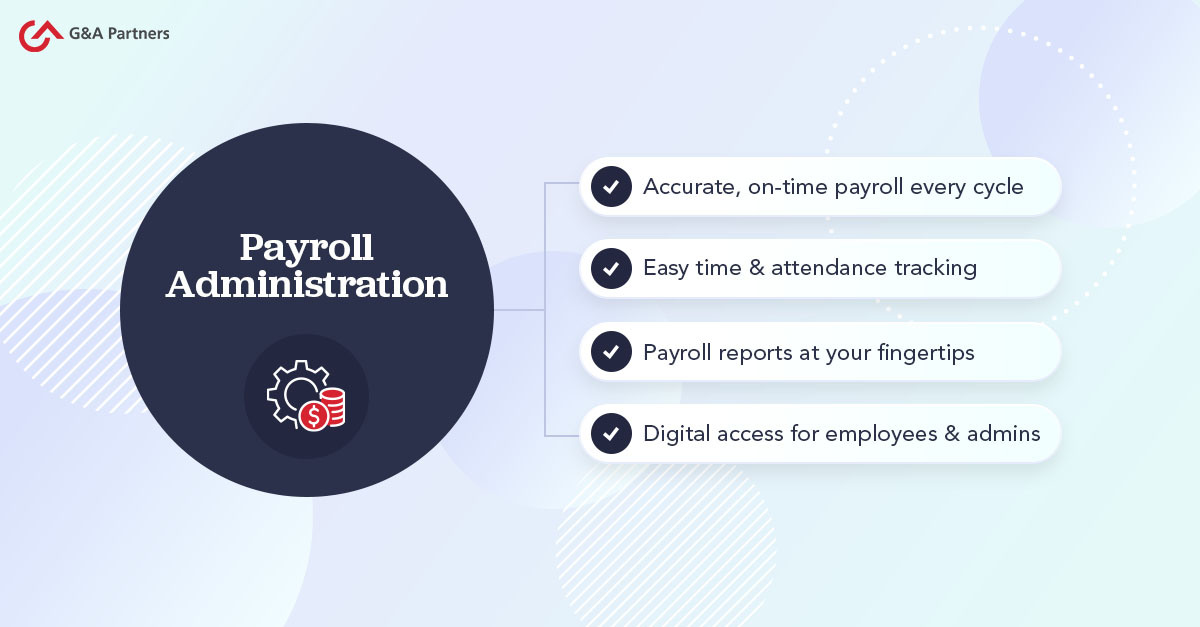
Task 2: Benefits Administration
What it entails: Administering employee benefits involves selecting and managing healthcare and ancillary plans, overseeing enrollment periods, handling employee questions, processing claims, and staying compliant with evolving regulations. For small to mid-sized businesses, the cost and complexity of offering competitive benefits can be a major challenge—especially when competing with larger companies.
How a PEO helps: Large companies have the numbers to negotiate better rates on health coverage—smaller businesses typically don’t. A PEO bridges that gap by combining the employees of many client companies into one large risk pool. At G&A, that means leveraging more than 100,000 worksite employees across 5,000+ businesses to access top-tier benefits at discounted rates. PEOs also provide full benefits administration outsourcing, relieving your team of time-consuming tasks like employee enrollment and claims processing.
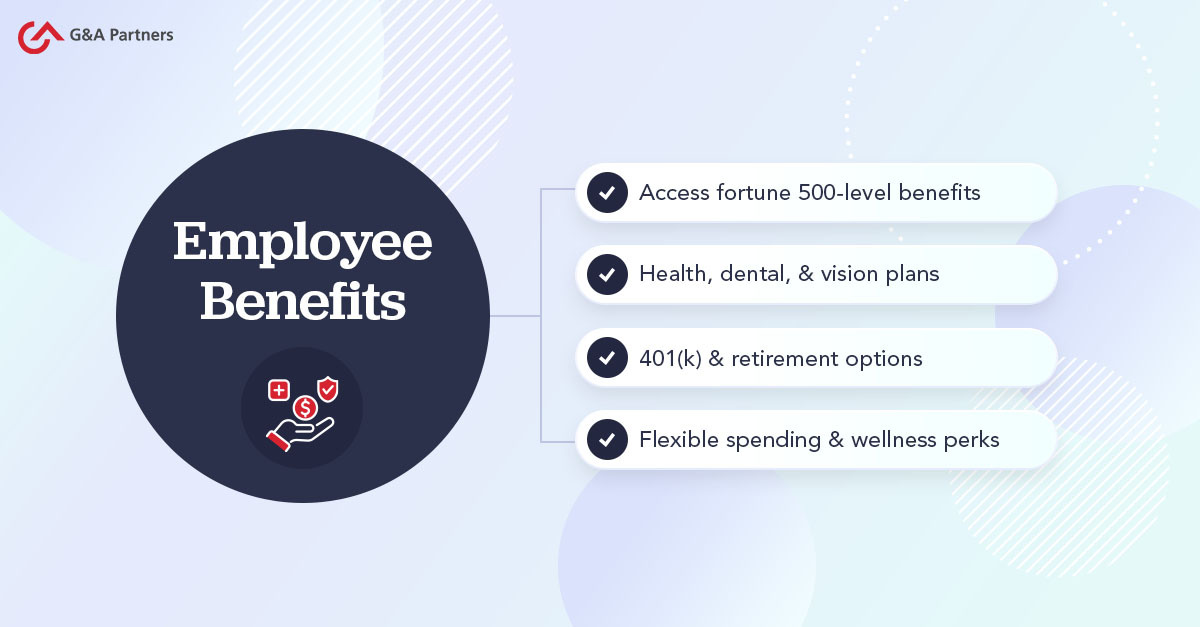
Task 3: HR Compliance and Risk Management
What it entails: Labor laws are complex and constantly evolving. To maintain HR compliance, you must navigate federal, state, and local laws that often vary depending on your industry, workforce size, and employee classifications. Failure to comply with laws governing hiring practices, wage and hour rules, medical and family leave, discrimination, workplace safety, workers’ compensation, and more can lead to audits, legal action, and costly penalties.
How a PEO helps: A PEO like G&A Partners has HR compliance experts on staff who stay up-to-date on regulatory changes and legal requirements in every region where you operate. We help you proactively develop and implement policies that identify and mitigate potential risks, supporting your business in meeting its legal responsibilities and helping reduce the chance of violations or penalties before they occur.
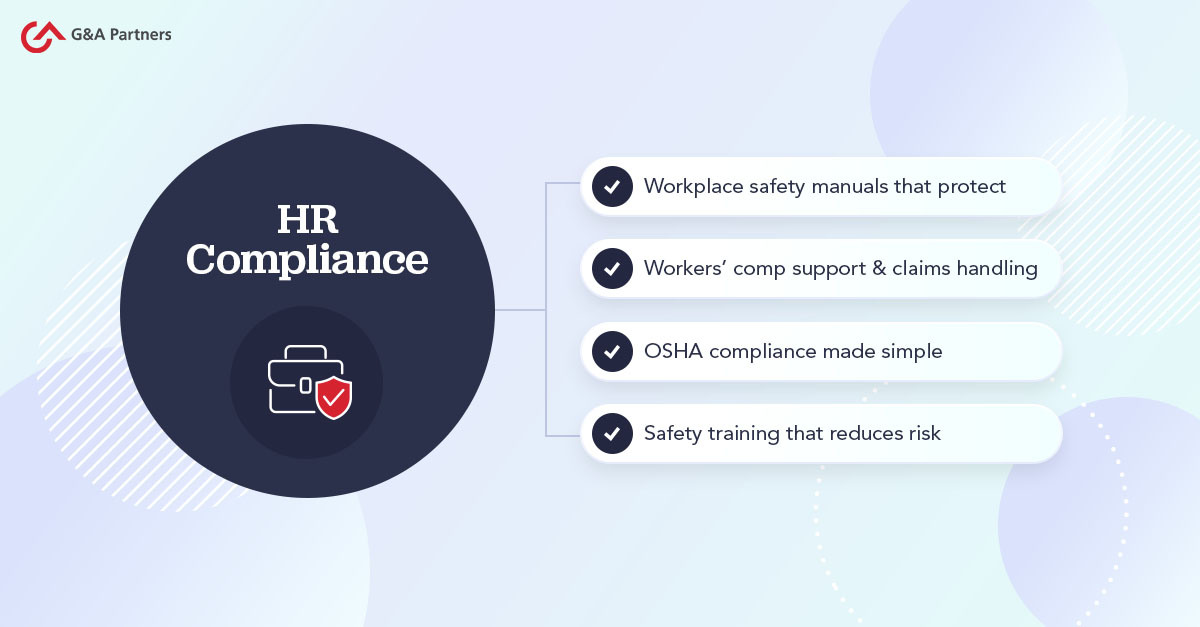
Task 4: Recruiting & Hiring
What it entails: Recruiting and hiring the right people is essential—but it’s also complex and time-consuming. It requires developing job descriptions that attract qualified candidates, promoting open roles across the right platforms, screening resumes, interviewing applicants, managing background checks, and ensuring a smooth onboarding experience. When done right, it helps you build a stronger workforce. When rushed or inconsistent, it can lead to costly turnover, culture misalignment, and missed business goals.
How a PEO helps: Through recruitment process outsourcing, a PEO can help you attract top talent more efficiently. That includes support with writing effective job descriptions, promoting openings on leading job boards, screening candidates, coordinating interviews, and managing pre-employment processes. Many PEOs also offer onboarding technology and guidance to ensure new hires feel supported from day one—helping to strengthen retention and accelerate productivity.
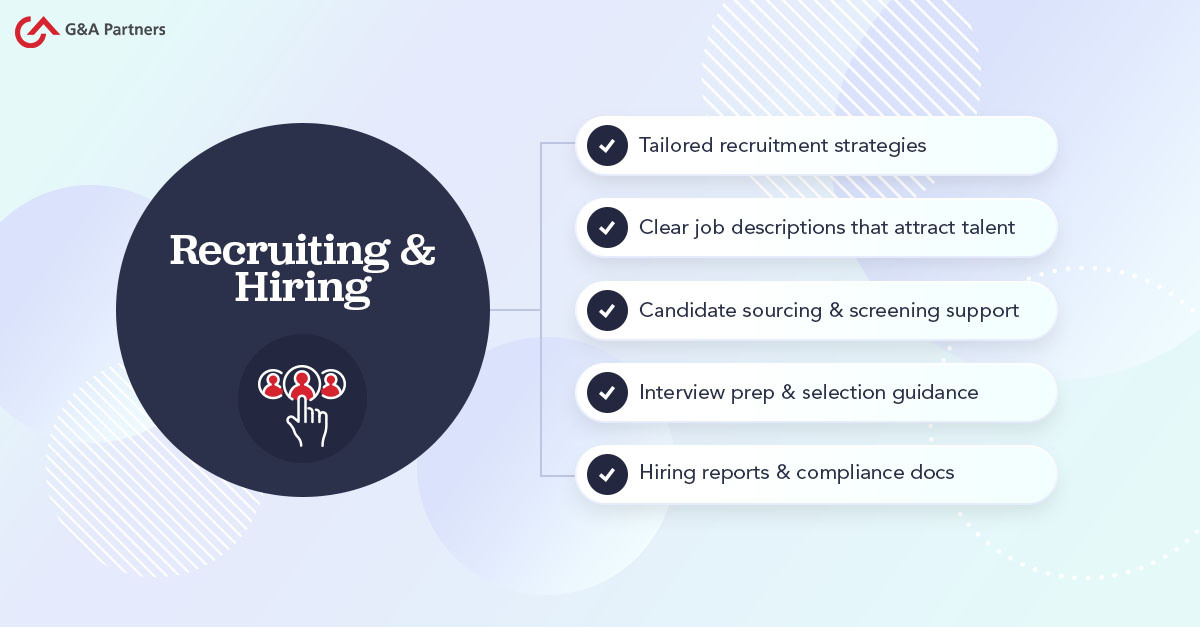
Task 5: HR Management
What it entails: HR management is a broad, ongoing initiative that includes developing workplace policies, managing employee relations, and supporting performance and professional development. Done well, it helps create a positive workplace culture that drives employee satisfaction, performance, and retention.
How a PEO helps: Through HR management outsourcing, a PEO gives you access to experienced HR professionals who can help you build and maintain effective systems and strategies. That includes developing clear, compliant policies; designing performance review processes; resolving workplace issues; and offering guidance on sensitive employee matters. As your workforce evolves, your PEO provides the expertise and structure to help you manage people more confidently and consistently.
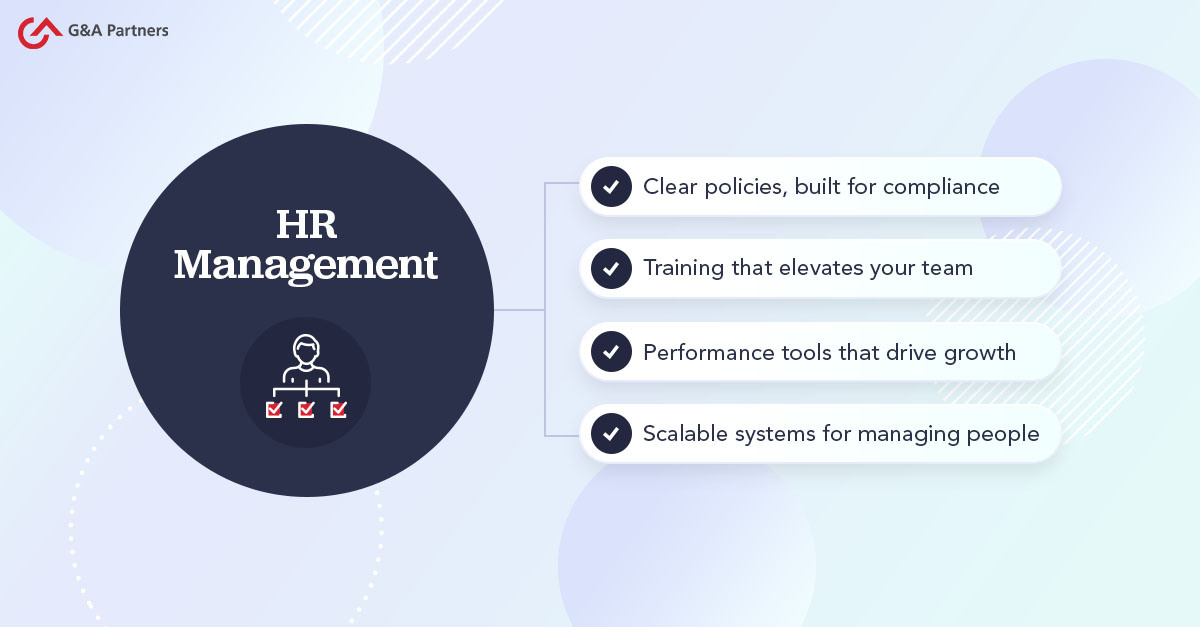
Task 6: HR Technology
What it entails: Modern HR technology (HRIS/HRMS) can help you save time, reduce human error, ensure compliance, manage recruitment, and improve employee engagement and satisfaction. It also enables you to gather and analyze workforce data that can lead to smarter, more effective HR strategies, policies, and implementation. Unfortunately, it can be difficult for smaller businesses to afford, manage, and integrate these advanced systems on their own.
How a PEO helps: Partnering with a PEO like G&A Partners can provide your business with access to integrated HR technology solutions that automate tasks, improve efficiency, and streamline HR functions. From self-service employee portals and performance tracking to detailed reporting tools and ongoing tech support, a PEO can deliver enterprise-level technology tailored to your needs—without the high cost or complexity.
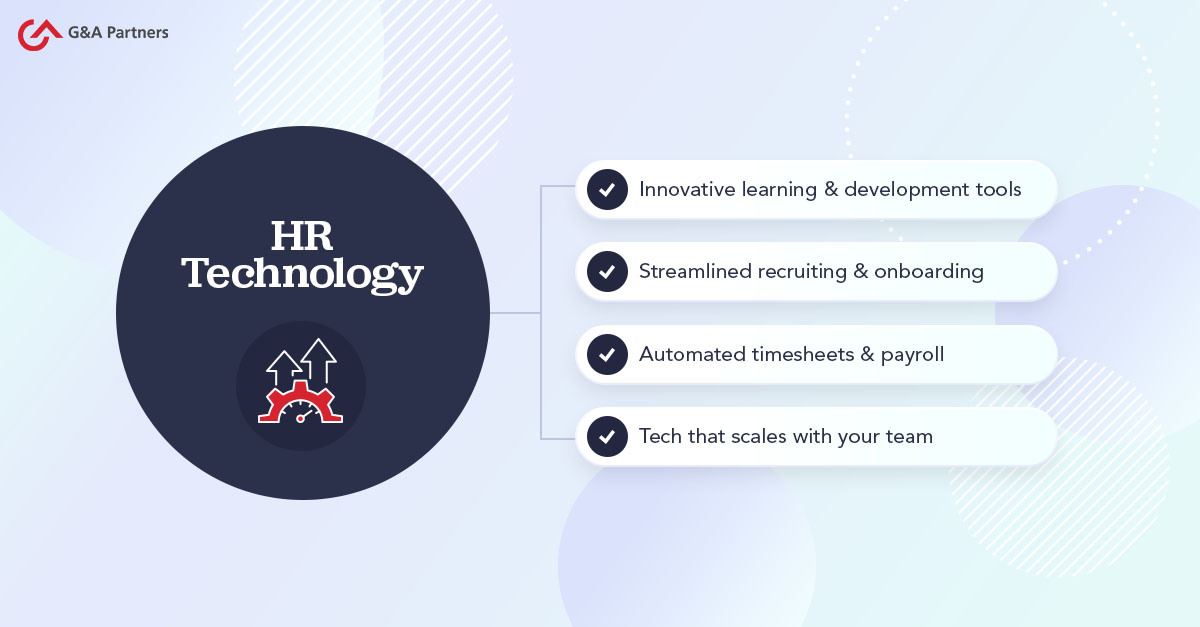
Comparing PEO vs. In-House HR
Both PEOs and in-house HR departments can manage essential HR functions—but they do so in different ways. Here’s a side-by-side look at how the two models compare across cost, compliance, benefits, and more.
Considerations |
PEO Model |
In-House HR Model |
Cost |
PEOs charge service fees but can help reduce overall costs by streamlining HR tasks and negotiating better employee benefits rates. |
Includes salaries for in-house HR personnel, plus recruitment, office overhead, equipment costs, and often higher benefits costs. |
Compliance Management |
Compliance experts monitor labor law changes and offer the tools and guidance your business needs to stay compliant and reduce risk. |
Your business is solely responsible for staying on top of ever-changing labor laws and regulations—in all jurisdictions in which you have employees—and you must adjust your policies and procedures to stay compliant. |
Employee Benefits |
By pooling thousands of employees across their many client companies, many PEOs can negotiate better rates and offer higher-quality benefits—the kind that are typically too costly for smaller businesses. |
Smaller companies often face higher costs for benefits, making Fortune 500-level benefits out of reach. They may pay more for lower-level benefits, limiting their competitiveness and their ability to attract top-level employees. |
Payroll Management |
PEOs handle payroll and tax administration, using advanced systems and expert support. |
Your business is responsible—and liable—for properly administering payroll and taxes, often without access to cost-effective, high-quality payroll technology. |
Recruiting & Hiring |
A PEO gives you access to professional assistance with job descriptions, candidate sourcing, screening, streamlined onboarding processes, and more. |
Your business handles the complex, extremely time-consuming, and often expensive process of recruiting and hiring the best talent in a competitive market. |
HR Expertise & Support |
PEOs offer dedicated HR expertise and strategic support—tailored to your business’s evolving needs. |
You’ll need to hire, train, and retain HR staff with the knowledge and experience necessary to manage everything from hiring to employee relations. |
Scalability |
PEOs are built to scale alongside your business, adapting services and support as your workforce grows. |
As your business grows, scaling in-house often means investing in additional personnel, new technologies, and expanded office resources to keep up with demand. |
Best Suited For |
Small to mid-sized businesses that need expert HR support, want to enhance the employee experience, need scalable systems and top-tier benefits to attract and retain talent, and want to free up time to focus on strategic initiatives and growth. |
Larger businesses with established HR departments, internal systems, and the capacity to manage all HR functions in-house. |
A PEO can also complement your existing HR team. By outsourcing repetitive administrative HR tasks, your internal staff can focus on strategic initiatives backed by the expertise and tools provided by a PEO.
Ready to partner with a PEO?
According to the National Association of Professional Employer Organizations (NAPEO), businesses that hire a PEO grow twice as fast, have 12% lower employee turnover, and are 50% less likely to go out of business. Plus, the average return on investment when a business uses a PEO, in cost savings alone, is 27%. If you have a growing business and want to give it the best chance to succeed, a PEO may be the support you need.





